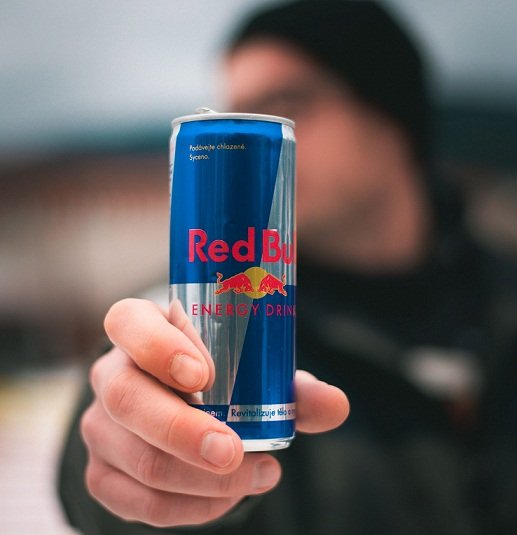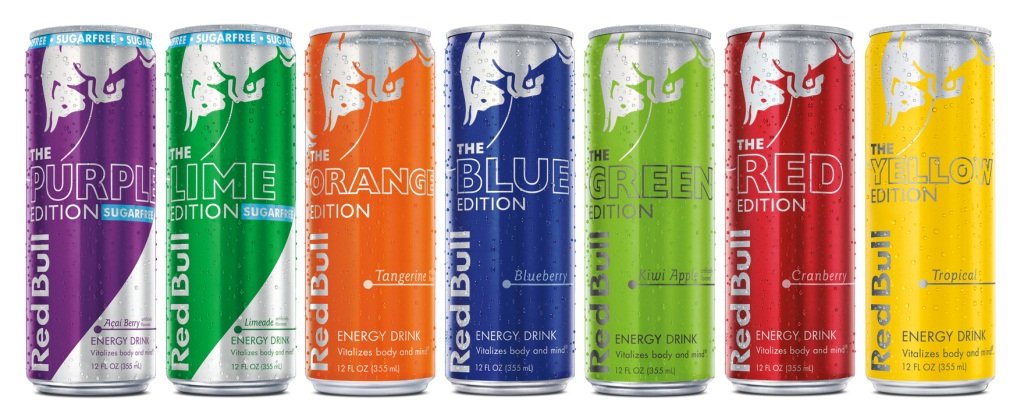Red Bull is a popular energy drink sold all over the world, since 1987. It was created by a company named Red Bull GmbH, an Austrian company (1). Red Bull is inspired by an energy drink in Thailand where the taste is made suitable for westerners (2).
Red Bull is generally sold in a tall can, slim and covered in its iconic silver and blue theme color.
What is Red Bull for? What’s in it?
On the company’s website, Red Bull states that the product “Gives you Wiiings”. Of course, this statement is appreciated worldwide by athletes, busy professionals, university students, and travelers on long haul journeys.
The ingredient breakdown of Red Bull found in its product label is as follows: carbonated water, sucrose, glucose, citric acid, taurine, sodium bicarbonate, magnesium carbonate, caffeine, niacinamide, calcium pantothenate, pyridoxine HCl, Vitamin B12 and artificial flavors, colors.
In a food technologist’s perspective, the components of Red Bull that significantly contribute to the taste are the sugars (sucrose, glucose), acidulant (citric acid), caffeine, and artificial flavors. The rest have little or no taste at all.
So, What does Red Bull Taste Like?

Generally, taste is subjective. Red Bull has a distinct flavor, claiming it to be their identity as a drink.
However, having been gone through the ingredients list of Red Bull’s original flavor variety, it can be concluded that the major mouthfeel would be carbonated. The first component in the ingredients list is carbonated water which makes up the majority of the product.
Now, in terms of flavor, it is safe to assume that the red bull is sweet because of the sugars present, with a hint of sourness because of the citric acid and a tinge of bitterness due to the caffeine content. However, the artificial flavor added would depend on the variety of Red Bull.
So now we have carbonated, sweet and sour with a hit of bitterness as an aftertaste.
This flavor is similar to that of a beer. Although, Red Bull is carbonated.
Bottom line: Taste is subjective, Red Bull can taste like beer but not for all those who might consume it.
What do various Red Bull Flavors Taste like?
The primary varieties of Red Bull are the: Red Bull Energy Drink (original), Red Bull Sugar-Free, and Red Bull Zero.
Red Bull Original has its distinct taste that makes Red Bull have its identity as a beverage. Some people like the taste, some do not. So it is up to you as a consumer if you will favor it or not.
Red Bull Sugar-Free Taste vs Red Bull Zero Taste
What’s the main difference between sugar-free and zero variety? Generally, we are talking about the type of sugars/ sweeteners present in the product.
In Red Bull Sugar-Free’s product label, it does not contain sucrose or glucose which are both found in the original flavor. Here, the sweeteners used are aspartame and acesulfame potassium. These are artificial or synthetic sweeteners used in combination to mask the bitter aftertaste of each other. It is sugar-free but not calorie-free.
This leads us to Red Bull Zero. This product has is both sugar-free and calorie-free. There is also an added sweetener, sucralose, a type of sugar alcohol, used in combination with the aspartame and acesulfame potassium.
Both of these varieties will definitely have a noticeable difference from the flavor attributed to the sweetness of the original Red Bull. Since natural sugar is different from sugar replacers. Just like when drinking a Regular Coke, Diet Coke, and a Coke Zero.
Here’s a summary of the different varieties Red Bull has on their website. Currently, existing are presented on this table:
| Variety | Flavor profile |
| Red Bull Red Edition | Cranberry |
| Red Bull Peach Edition | Peach-Nectarine |
| Red Bull Yellow Edition | Tropical |
| Red Bull Blue Edition | Blueberry |
| Red Bull Coconut Edition | Coconut Berry |
| Red Bull Green Edition | Kiwi Apple |
| Red Bull Orange Edition | Tangerine |
| Red Bull Pear Edition – Sugarfree | Crisp Pear |

All Red Bull flavor varieties are artificially flavored. Let’s have a short run through on how should each flavor should taste like. Basically, describing flavor notes and profile.
Cranberry is known for its overwhelming acidity. There is a sweet and tart flavor profile, usually associated with wine. The taste when measured between sweetness and tartness spectrum, cranberries can possibly be described as a hybrid between raspberries and red currants. Thus, it should fit the carbonated base of Red Bull.
Very sweet with a little bit of acidity, typically an acid tanginess coupled with a sweet flowery taste or a classic peach taste is what generally a peach taste like. Nectarine is one of its varieties. This profile is also compatible with Red Bull’s carbonated base.
Although there is no further description of tropical fruit profile by Red Bull, generally tropical fruits are those fruits cultivated in hot and humid regions of the world. This can be a combination of common tropical produce such as mangoes, guava, bananas, oranges and such. Since these are also on the acid and tangy flavor profile, this should be a good match for Red Bull’s carbonated base.
A slightly sweet taste with a bit of acid is what a primary descriptor for a blueberry can be. The distinct juiciness of a ripe blueberry fruit can also be a good blend with Red Bull’s base.
Coconut berry, kiwi apple, tangerine, and crisp pear also shares the same flavor profile of being sweet and sour. The difference lies in the distinct flavor each fruit gives.
In total, there is a total of eight different tastes that “give you wings” whenever you need them.
Conclusion
Red Bull is an energy drink that has a distinct flavor, unique on its own. It might taste like beer for some, but may not for some.
However, there are different varieties out in the international market which consumers can choose from. Since flavor is a subjective preference, what might be pleasing for your palate may not be for me. Good thing there are a lot of flavors to choose from.
Eiselle Joyce R. Hidalgo is a food technologist and a food product developer based in Manila, Philippines. She completed her Bachelor's Degree in Food Technology at the University of Santo Tomas and also works as a college professor in the Department of Nutrition and Food Sciences at the same university. She has been in the food industry for the past 8 years and worked as a flavor researcher, recipe writer, recipe developer, and product application specialist at various companies. Eiselle Joyce Hidalgo loves formulating and writing recipes to local magazines and even authored a few cookbooks and baking books.
